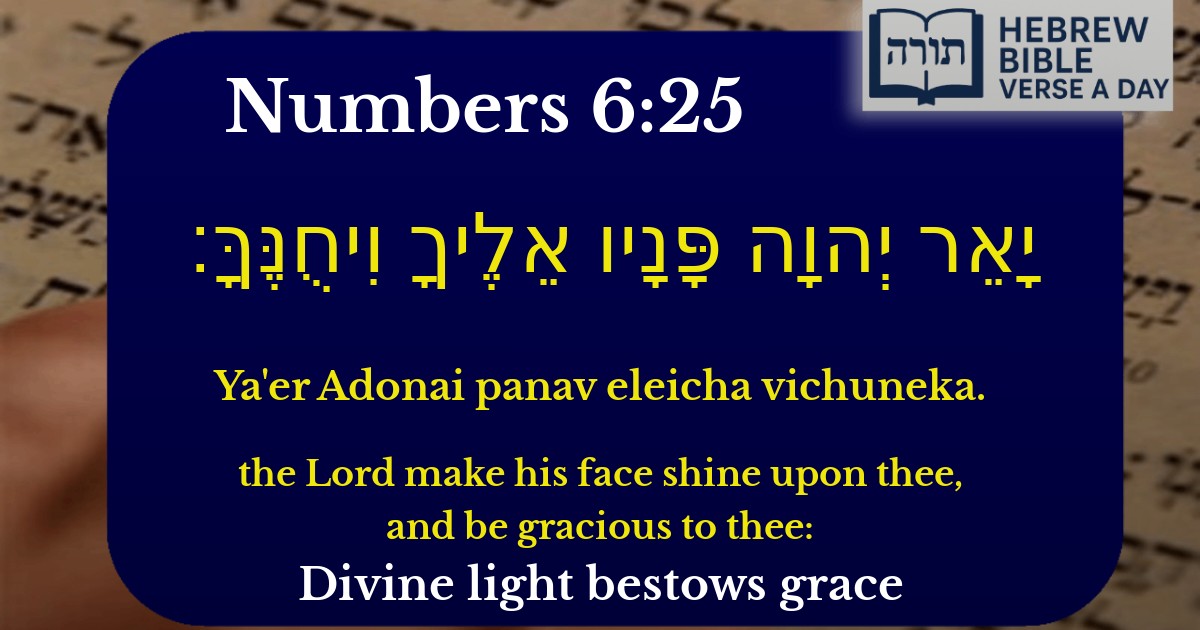Join Our Newsletter To Be Informed When New Videos Are Posted
Join the thousands of fellow Studends who rely on our videos to learn how to read the bible in Hebrew for free!
Hebrew Text
יָאֵר יְהוָה פָּנָיו אֵלֶיךָ וִיחֻנֶּךָּ׃
English Translation
the Lord make his face shine upon thee, and be gracious to thee:
Transliteration
Ya'er Adonai panav eleicha vichuneka.
Hebrew Leining Text
יָאֵ֨ר יְהֹוָ֧ה <small>׀</small> פָּנָ֛יו אֵלֶ֖יךָ וִֽיחֻנֶּֽךָּ׃ <span class="mam-spi-samekh">{ס}</span>
יָאֵ֨ר יְהֹוָ֧ה ׀ פָּנָ֛יו אֵלֶ֖יךָ וִֽיחֻנֶּֽךָּ׃ {ס}
🎵 Listen to leining
Parasha Commentary
📚 Talmud Citations
This verse is quoted in the Talmud.
📖 Sotah 38b
The verse is cited in the context of discussing the priestly blessing (Birkat Kohanim), where the Sages analyze the wording and significance of the blessings given by the priests.
📖 Megillah 25b
The verse is mentioned in a discussion about the sanctity of the priestly blessings and the conditions under which they may be recited.


Explanation of the Verse
The verse "יָאֵר יְהוָה פָּנָיו אֵלֶיךָ וִיחֻנֶּךָּ" (translated as "the Lord make His face shine upon thee, and be gracious to thee") is part of the Birkat Kohanim (Priestly Blessing) found in Bamidbar (Numbers) 6:25. This blessing is one of the most profound expressions of divine favor in the Torah, conveying Hashem's benevolence and kindness toward the Jewish people.
Rashi's Commentary
Rashi explains the phrase "יָאֵר יְהוָה פָּנָיו אֵלֶיךָ" ("the Lord make His face shine upon thee") as an expression of divine goodwill and illumination. He interprets "shine" (ya'er) as a metaphor for Hashem granting wisdom, understanding, and enlightenment to the recipient. The "face" (panav) of Hashem represents His presence and favor, indicating that He looks upon the individual with kindness and grace.
Rambam's Perspective
In Hilchot Tefillah U'Birkat Kohanim (Laws of Prayer and the Priestly Blessing), Rambam emphasizes the sanctity and power of this blessing. He notes that the Kohanim serve as conduits for divine blessing, and the phrase "וִיחֻנֶּךָּ" ("and be gracious to thee") signifies that Hashem grants undeserved kindness (chen), even when the recipient may not be fully worthy.
Midrashic Interpretation
The Midrash Tanchuma (Naso 10) elaborates on the imagery of divine light, comparing Hashem's shining countenance to the radiance of the sun. Just as the sun illuminates the world, Hashem's "light" provides spiritual and material sustenance. The Midrash also connects this verse to the concept of Shechinah (Divine Presence), suggesting that when Hashem "shines His face" upon someone, it is a manifestation of His closeness and protection.
Key Themes in the Verse
Practical Implications
In Jewish practice, this verse is recited daily during the Birkat Kohanim in the Amidah prayer and on festivals when the Kohanim bless the congregation. It serves as a reminder of Hashem's constant desire to bestow goodness upon His people and encourages individuals to seek His light in their lives.